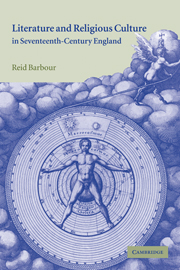Book contents
- Frontmatter
- Contents
- Acknowledgements
- Introduction: spirit and circumstance in Caroline Protestantism
- Chapter 1 The church heroic: Charles, Laud, and Little Gidding
- Chapter 2 Great Tew and the skeptical hero
- Chapter 3 Between liturgy and dreams: the church fanciful
- Chapter 4 Respecting persons
- Chapter 5 Decorum and redemption in the theater of the person
- Chapter 6 Nature (I): post-Baconian mysteries
- Chapter 7 Nature (II): church and cosmos
- Conclusion: Rome, Massachusetts, and the Caroline Protestant imagination
- Notes
- Index
Chapter 4 - Respecting persons
Published online by Cambridge University Press: 22 September 2009
- Frontmatter
- Contents
- Acknowledgements
- Introduction: spirit and circumstance in Caroline Protestantism
- Chapter 1 The church heroic: Charles, Laud, and Little Gidding
- Chapter 2 Great Tew and the skeptical hero
- Chapter 3 Between liturgy and dreams: the church fanciful
- Chapter 4 Respecting persons
- Chapter 5 Decorum and redemption in the theater of the person
- Chapter 6 Nature (I): post-Baconian mysteries
- Chapter 7 Nature (II): church and cosmos
- Conclusion: Rome, Massachusetts, and the Caroline Protestant imagination
- Notes
- Index
Summary
As circumstances of the faith, both heroism and fancy are nodal terms by means of which Caroline writers mediate the outward and inward conditions of worship and take stock of the rival ways in which their church might be projected above the gray shades of casuistry. When writers in the 1620s, 30s, and 40s attend to yet a third term, the category of the “person,” their exploration of religious circumstance is no simpler even if at times it is more mundanely social. For that oft repeated Biblical stricture against respecting persons leads Caroline writers into a wide range of questions – about the criteria for ordination, for salvation, and for the appropriate interaction of saints and the worldly wise. The circumstance of the person has some points of convergence with other circumstances. With heroism, notions of the person bear the burden of accounting for what sets the church or its ministers apart from other churches or the laity. With fancy, competing definitions of the person provoke an inquiry into the inner human processes responding to or searching for saving grace. As Guibbory has argued, attitudes toward religious ceremony have corollaries in attitudes toward social organization; and indeed the accommodation made by saints in navigating the social order is one of the primary motivations for investigating the circumstance of persons.
In Caroline England, the fascination with the status of the “person” centers finally on two often conflicting queries.
- Type
- Chapter
- Information
- Literature and Religious Culture in Seventeenth-Century England , pp. 118 - 150Publisher: Cambridge University PressPrint publication year: 2001



